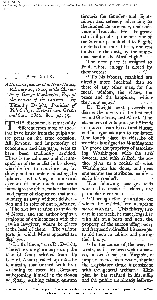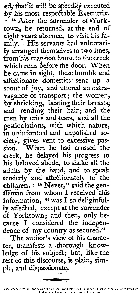 ―431― ―431―
Art. XLIX.
A Discourse, delivered at New-Haven,
February 22, 1800, on the Charac-
ter of George Washington, Esq. at
the request of the Citizens. By
Timothy Dwight, President of
Yale College. New-Haven. Green
and Son. 1800. 8vo. pp. 55.
THIS discourse is remarkably
different from most of those
that have issued from the pulpit and
the press on the same occasion.
All fervour, and impetuosity of
conception and language, seem to
have been studiously avoided.
There is the calmness and circum-
spection of the analist in his closet,
who desires to convince us, by
slowly and accurately adjusting the
balance, and taking a numerical
account of how much one scale
outweighs the other, rather than the
bold career of eloquence, that aims
to hurry us away without delibera-
tion and in spite of our reluctance.
The text has relation to the deeds
of Moses, and the author begins a
catalogue of eminent men with the
Jewish lawgiver, whom he places
at the head of them. The various
parts in which Moses appeared are
displayed.
“In all of them,” says Dr. Dwight,
“he is the same glorious person; the
man of God; selected from the
race of Adam; called up into the
mountain, that burned with fire;
ascending to meet his Creator;
embosoming himself in the clouds
of Sinai; walking calmly onward
through the thunder and light-
nings; and serenely advancing to
the immediate presence, and con-
verse of Jehovah. He is the great-
est of all prophets; the first type of
the Saviour; conducted to Pisgah,
unclothed of mortal flesh, and en-
tombed in the dust, by the imme-
diate hand of the Most High.”
The next place is assigned to
Paul, whose eulogy is closed by
these words:
“To his labours, mankind are
directly more indebted than to
those of any other man, for the
moral wisdom, the virtue, the
peace and the happiness, which
they now enjoy.”
Dr. Dwight next proceeds to
discuss the merits of the first and
second Gustavus, and Alfred. The
characters of Adolphus and Alfred,
are quoted from Russel and Hume,
with a slight addition to the latter.
The fourth place in this list of
worthies is assigned to Washington.
To prove the propriety of associat-
ing Washington with the two
Swedes, and with Alfred, the au-
thor gives us a recital of what
Washington has done, and next
enumerates the attributes manifest-
ed in his conduct.
The following passages with
which this recital is closed, are
particularly curious:
“Through the plantation on
which he resided, ran a stream
stored with fish. This fishery, two
days in the week, he made, together
with his own boats and nets, the
property of the surrounding poor;
and frequently directed his servants
to aid them in taking and curing
their booty.
“In the course of the war, he
wrote, as I have been well inform-
ed, to his friends in Virginia, a
proposal to free his servants, should
the Legislature think it consistent
with the general welfare. This
plan he has realized in his will;
and the public are already inform-
 ―432― ―432―
ed, that it will be speedily executed
by his most respectable Executrix.
“After the surrender of York-
town, he returned, at the end of
eight years absence, to visit his fa-
mily. His servants had voluntari-
ly arranged themselves in two lines,
from his mansion house to the creek
which runs before the door. When
he came in sight, these humble and
affectionate domestics sent up a
shout of joy, and uttered an extra-
vagance of transport; the women,
by shrieking, beating their breasts,
and rending their hair; and the
men by cries and tears, and all the
gesticulations, with which nature,
in uninformed and unpolished so-
ciety, gives vent to excessive pas-
sion. When he had crossed the
creek, he delayed his progress to
his beloved abode, to shake all the
adults by the hand, and to speak
tenderly and affectionately to the
children. “Never,” said the gen-
tleman from whom I received this
information, “was I so delightful-
ly affected, except at the surrender
of Yorktown; and then, only be-
cause I considered the indepen-
dence of my country as secured.”
The author's view of his charac-
ter, manifests a thorough know-
ledge of his subject; but, like the
rest of this discourse, is plain, sim-
ple, and dispassionate.
|